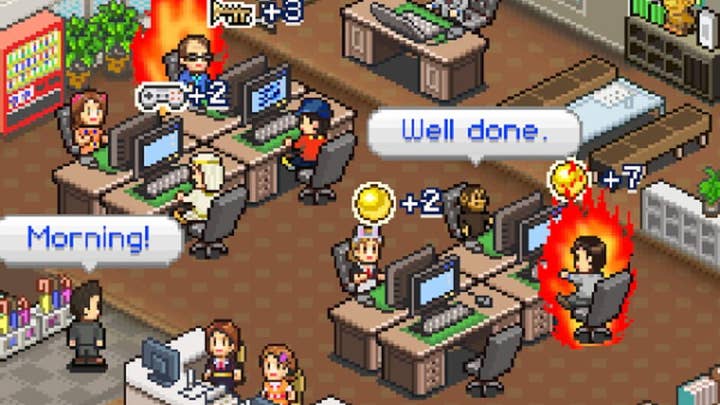Seven steps to improving your company culture
Avoid the perils of a toxic culture by building one on passion, creativity and empowerment
Many development studio and games company owners simply don't recognise the importance of company culture -- we certainly didn't in the early days. It's invisible, it doesn't show up in the accounts and you can't touch it; but you, your team and your clients can feel it.
It's worth thinking about company culture when you start out, because once it's set it can be challenging to change it, and over time it might drift away from your ideal, so you need to pay attention and steer it back on course.
The most important asset of a game development studio is its staff, and creative staff can't be handcuffed to desks and forced to work. Your team needs to be motivated and passionate about creating great games. Talented people have choices and unless they love coming to work -- because of the game they are working on or the people they work with, and ideally both -- they will move on.

This article offers advice to anyone running a studio or with a general interest in the games development industry. It's based on our extensive experience of developing games and running studios for over 35 years. Although everyone has their own style, these are the things we think are worth considering.
Where to start?
First, define what you want the company culture to be. For us, it was to have a bright, enthusiastic, hard-working, creative, passionate place where everyone feels part of the company and valued.
Communicate what your vision for your company culture with current staff and new recruits. The aim is to have a great studio where critically and commercially successful games are made. Ensure everyone knows the role they play, and how being part of that will benefit their long term careers. They will feel secure, and they will want to stay.
Give everyone a voice and listen
Having built a great team, you need to listen to them. They won't always be right, and ultimately the decisions are yours, but it's important to allow everyone to contribute their thoughts and ideas so they feel they have a voice in the future direction of the studio. Allow your team the time to raise concerns, propose ideas and talk them through.
A good structure includes daily scrums, plus regular confidential one-to-ones with each of the team. It takes time, but it can stop problems festering until they're too big to deal with. You get to understand each person's motivations and they feel much more part of the team.
Call specific meetings every month or two to discuss medium -- and long-term opportunities and threats. Larger group discussions (more than about eight people) can break down unless exceptionally well chaired, so you'll need a structure to handle larger team sizes.
"Think about company culture when you start out, because once it's set it can be challenging to change it"
Idea generation and feedback should be open so everyone feels their points are heard. Record who made each suggestion so credit can be given when those ideas are used.
From time to time, communicate the broader strategy of the company, and any changes, and allow people to question them. Communicate any news -- good or bad -- about the company internally before they hear it from others or, worse still, read about it on a public site.
Don't say no, say why not
If you shoot down ideas without due consideration, people will become disengaged. I actively try and avoid the word 'no' -- that doesn't mean I agree to everything, but when I'm tempted to say 'no', I first go through my thought process to see why. Communicating this clears up misunderstandings, and gives insight into the bigger picture. Granted, it takes a little longer, but it results in better morale, and better suggestions in the future.
Make everyone's responsibilities clear
Always support your team. If you don't like the choices they have made, talk to them in private raising your concerns. Discuss why they made the choice they did and explain the reasons you would have done things differently. Remind them you are always there to ask if they are unsure.
For bigger decisions, it may be that an approval process is required, but make sure this is efficient and only use it when absolutely necessary, so your team remains motivated and empowered.
Empower staff to handle their own time management
Each team member will have a contract that defines the hours and pay. We found the best approach is to respect people and trust they will adhere to this, and in most cases people don't take advantage. Ensure everyone knows what's expected of them and then allow them to manage their time. If they are late in, need to go to the dentist and so on, let them make the time up and don't over-manage them.
"Record who made each suggestion so credit can be given when those ideas are used"
If you have any concerns, raise them in the weekly one-to-ones. Make sure new recruits get into good habits before you pass their probation.
Minimise overtime, avoid crunch
Now comes the thorny issue of requested, necessary overtime. Be very careful: exploiting someone is a very quick way to alienate them. There are times when a 'push' is required, especially in game development. All developers respect there are times when the deadline must be hit.
Make sure your team is aware of all schedules and what's required of them well in advance. If you have a good, engaged and empowered team they are likely to pull the extra hours for the good of the game and the studio. When studios are in their infancy, it's often necessary and accepted, but as a studio matures so does its staff. They have other pulls on their time -- family commitments or just the need to unwind.
If the game schedule means you need to request lots of overtime, it's best to have a system that recognises and rewards the extra time. Nobody should be forced to work beyond their contracted hours, and if they do it should be recorded and recognised with some form of compensation.

Free food is a good gesture if that's all that can be afforded, but a fairer approach is to count the hours and either pay them or add them to the annual holiday allowance (Time Off In Lieu or TOIL). This time can then be taken when the pressure has subsided.
Only ask for what's required, on the critical path, and from those who can do it. If some team members who are on schedule, or even ahead, want to volunteer overtime during times of 'push' for the camaraderie then that's great, but they shouldn't be expected to.
"Nobody should be forced to work beyond their hours, and if they do, it should be recognised with some form of compensation"
I've avoided the word 'crunch' because you absolutely should avoid it ever occurring. People's definition of crunch varies, but mine is forcing people to work against their will. Don't do it.
Avoid creating a 'greed culture'
Never attempt to motivate purely by money. Factory assembly work can be run by rewarding directly against results, but that's because it's repetitive, non-creative work. Game development is not a production line. In our experience, financial rewards for targets met or exceeded changes the focus from creativity and team spirit to greed.
Implement structured pay reviews
You want a team of talented, creative people who just want fair pay. The industry has reached a stage of maturity where employees know roughly what salary their position should be paid. As a responsible employer you need to know these figures and pay them if you can. If you can't then you need to ensure they believe you will do right by them when you are able to -- and mean it.
Paying more when someone threatens to leave doesn't work either. If they're there for the money, and not the team or the game, you're fighting a losing battle. They won't have their heart in their work, and morale suffers; and if the rest of the team finds out, morale suffers even more.
"Game development is not a production line. Financial rewards changes the focus from creativity and team spirit to greed"
We've always tried to ensure that we have a fair and unbiased method by which individuals salaries are determined, and an objective, understandable, fair system of pay reviews, ensuring each person knows what is required for pay rises and promotions. This means everyone knows they are being paid fairly, and in proportion to the value they bring to the studio.
If someone demands more, sometimes you just have to wish them luck and let them go. Of course, the smaller the team, the more vital every individual is -- so having any key developer leave is a serious problem, both for the game and ultimately for the survival of the studio. If you are that studio head, that's a big responsibility.
Very occasionally over the years, we've come across people who continually try to improve their pay over and above what's fair, by making demands and threatening to leave. It's best to identify them during the interview and not hire them in the first place. Watch for signs of caring more about the money than the project and the work.
So what is the ideal company culture?
One where people want to do their best, want the game and the company to be as successful as possible, and want to be part of making that happen. That's why studio culture matters.
Create a fun productive place where people want to work, with a fair pay structure and time management, where all suggestions are listened to, and you'll have a happy, productive and loyal team. That's the best way to make great games.
Philip Oliver is co-founder of new consultancy firm Game Dragons and one half of the veteran Oliver Twins. He has previously written a series of columns offering advice to developers on growing their business. You can read the rest here.
The GamesIndustry.biz Academy guides to working in games cover a wide range of topics, from how to find a job in the games industry to how to retain your staff.
Have a browse.
